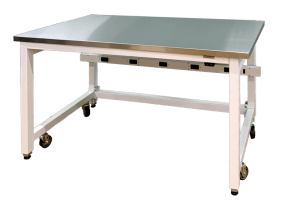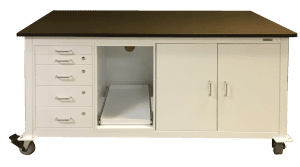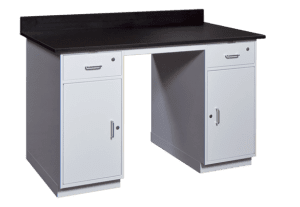Selecting the right work surface for your application is a crucial decision when outfitting your work area; it not only impacts productivity, but also plays a significant role in ensuring the safety and longevity of your workspace. Workstations in laboratories, industrial facilities, and healthcare settings often face exposure to a wide array of harsh chemicals, making it essential to select worksurface materials that can withstand such conditions. In this guide, we’ll dig into three of our top chemical-resistant work surface options: Stainless Steel Type 304, Epoxy Resin, and Phenolic Resin. We’ll review their composition, benefits, drawbacks, pricing considerations and where they are commonly used.
STAINLESS STEEL TYPE 304: THE GOLD STANDARD
Composition: Stainless Steel Type 304 is a robust alloy primarily composed of iron, chromium, and nickel, creating a corrosion-resistant surface.

BENEFITS
- Exceptional Corrosion Resistance: Type 304 stainless steel excels in resisting acids, bases, and solvents, making it indispensable in harsh chemical environments.
- Unrivaled Durability: This material can endure heavy use and is resistant to physical damage, high temperatures, rust, and staining.
- Hygiene Excellence: Stainless steel is easy to clean and sterilize, a crucial attribute for laboratories and healthcare facilities.
DRAWBACKS
- Cost: While highly effective, stainless steel can be relatively expensive.
- Susceptible to Scratches: Despite its durability, it can still accumulate scratches over time affecting its aesthetics.
Common Applications: Laboratories, clean rooms, pharmaceutical manufacturing, food processing, and medical environments.
EPOXY RESIN: STRINGENT CHEMICAL RESISTANCE AND HYGIENE STANDARDS
Composition: Epoxy resin work surfaces are a blend of epoxy, a thermosetting polymer, and filler material likes, stone, quartz, or glass.

BENEFITS
- Excellent Chemical Resistance: Epoxy resin is a champion in highly resisting a wide range of chemicals, acids, and solvents.
- Ease of Cleaning: Its non-porous surface makes cleaning and maintenance a breeze.
- Versatility: Epoxy resin can be tailored to suit various applications and comes in different colors and textures.
DRAWBACKS
- Limited Heat-Resistance: High temperatures can damage epoxy resin, making it unsuitable for hot equipment applications.
- Susceptible to scratching or staining: Surface scratching can occur, and staining can result from expose to spills for an extended period.
Common Applications: Laboratories, colleges, healthcare settings, colleges & universities, and light industrial workspaces.
PHENOLIC RESIN: COST-EFFECTIVE AND CHEMICAL-RESISTANT
Composition: Phenolic resin work surfaces constitute layers of kraft paper soaked in phenolic resin, compressed, and cured.

BENEFITS
- Excellent Chemical Resistance: Phenolic resin stands strong against most chemicals and solvents.
- Cost-Effectiveness: Often the most budget-friendly choice compared to stainless steel or epoxy resin.
- Sturdy Build: It can bear heavy loads and is impact resistant.
DRAWBACKS
- Limited Aesthetics: Phenolic resin may lack the visual appeal of the other options.
- Not Heat-Resistant: Unsuitable for high-temperatures, like epoxy resin.
Common Applications: Reference laboratories, colleges & universities, workshops, and industrial settings.
PRICING CONSIDERATIONS
Generally, stainless steel is the most expensive of the work surface options while phenolic resin is the most cost-effective. Epoxy will fall mid-range between the other two materials. In many instances, size, color, and material grade can impact the price of the material, so it is always a good practice to obtain current quotes when planning.
CARE AND MAINTENANCE OF YOUR WORKSURFACE
Regular cleaning and maintenance will aid in the longevity, effectiveness of the material, and appearance of the work surfaces. It is recommended that any spills should be cleaned up quickly and that steel wool or other abrasive materials or cleaners should be avoided.
CHOOSING THE RIGHT MATERIAL FOR YOUR NEEDS
When selecting a work surface material, it’s crucial to assess the chemicals and conditions it will encounter. Stainless steel, epoxy resin, and phenolic resin are all excellent choices, but their suitability depends on your specific needs. Consider factors such as the types of chemicals used, the level of durability required, and budget constraints. Ask for samples to test on.
Ultimately, the choice between stainless steel, epoxy resin, and phenolic resin will depend on your specific needs and priorities. Consider the unique requirements of your workspace and select the work surface that best aligns with your goals for safety, durability, and cost-effectiveness.
Contact Workplace today.

